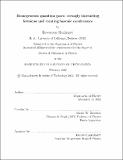Homogeneous quantum gases: strongly interacting fermions and rotating bosonic condensates
Author(s)
Mukherjee, Biswaroop
DownloadThesis PDF (39.20Mb)
Advisor
Zwierlein, Martin W.
Terms of use
Metadata
Show full item recordAbstract
Quantum gases are an ideal platform for studying problems in many-body physics. Highly tunable and reconfigurable, these systems work as quantum simulators for a range of other quantum mechanical systems, ranging from neutron stars, to superconductors, to quantum Hall systems. A crucial degree of freedom is the external geometry of the trapping potential. In this thesis, we describe experiments on creating homogeneous quantum gases and performing measurements using them.
The first section of the thesis focuses on homogeneous Fermi gases, where we use tailored optical potentials to trap 6Li atoms in a homogeneous box potential. We observe uniform fermionic superfluids and measure the temperature dependence of the noninteracting Fermi surface. Radiofrequency (rf) spectroscopy offers unique insights into the spectral properties of Fermi gases. We exploit the high signal to noise ratio of rf spectroscopy of uniform Fermi gases to obtain precise measurements of the thermodynamic contact. We observe a dramatic change in the contact at the superfluid transition.
The second section of this thesis concerns uniform rotating bosonic condensates. We discuss a new experimental apparatus and outline how geometric squeezing can be used to prepare systems of quantum gases in the lowest Landau level, a long sought-after goal. Lastly, we show a surprising spontaneous crystallization of these quantum Hall systems, and find that it is driven by interactions.
Date issued
2022-02Department
Massachusetts Institute of Technology. Department of PhysicsPublisher
Massachusetts Institute of Technology